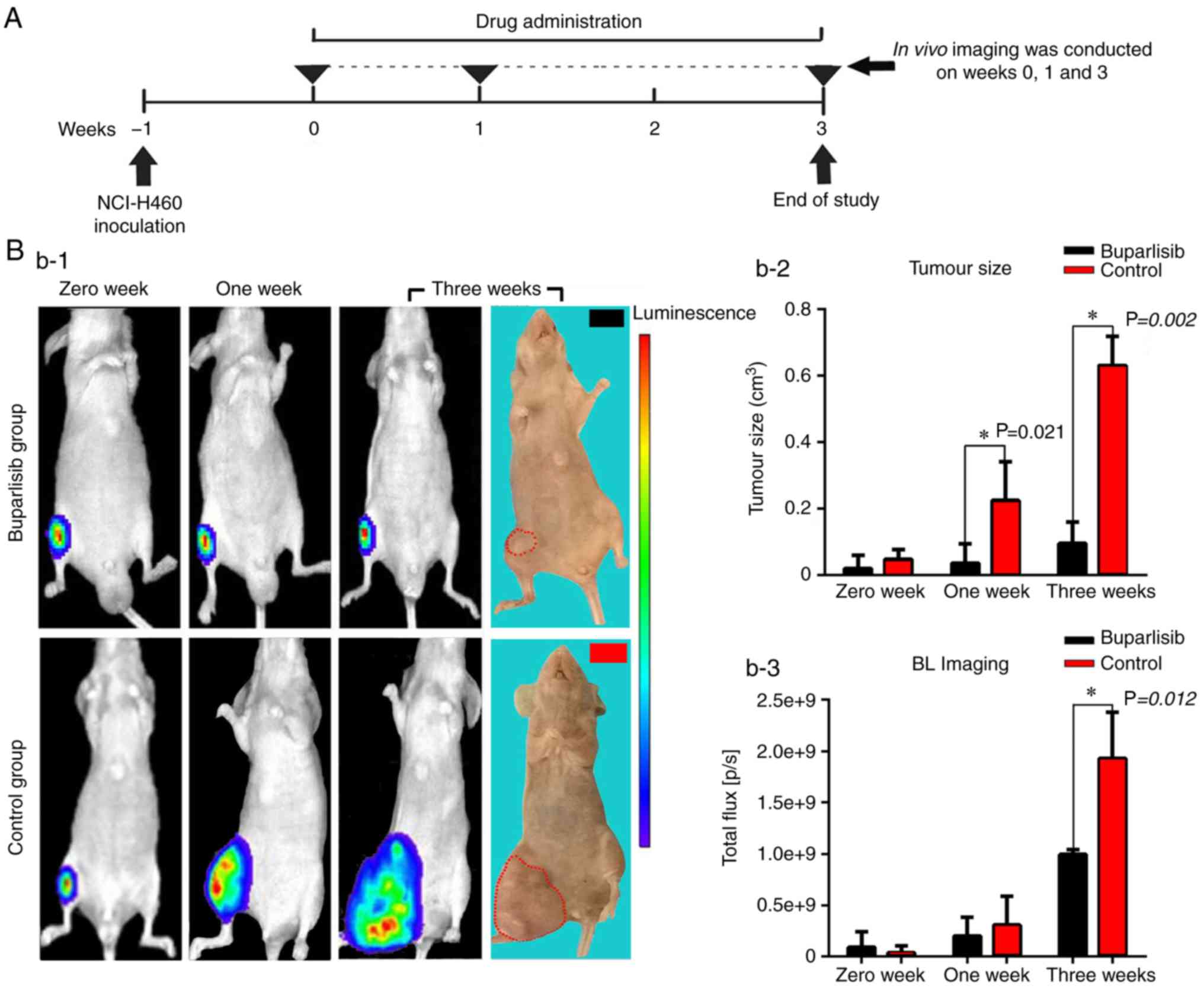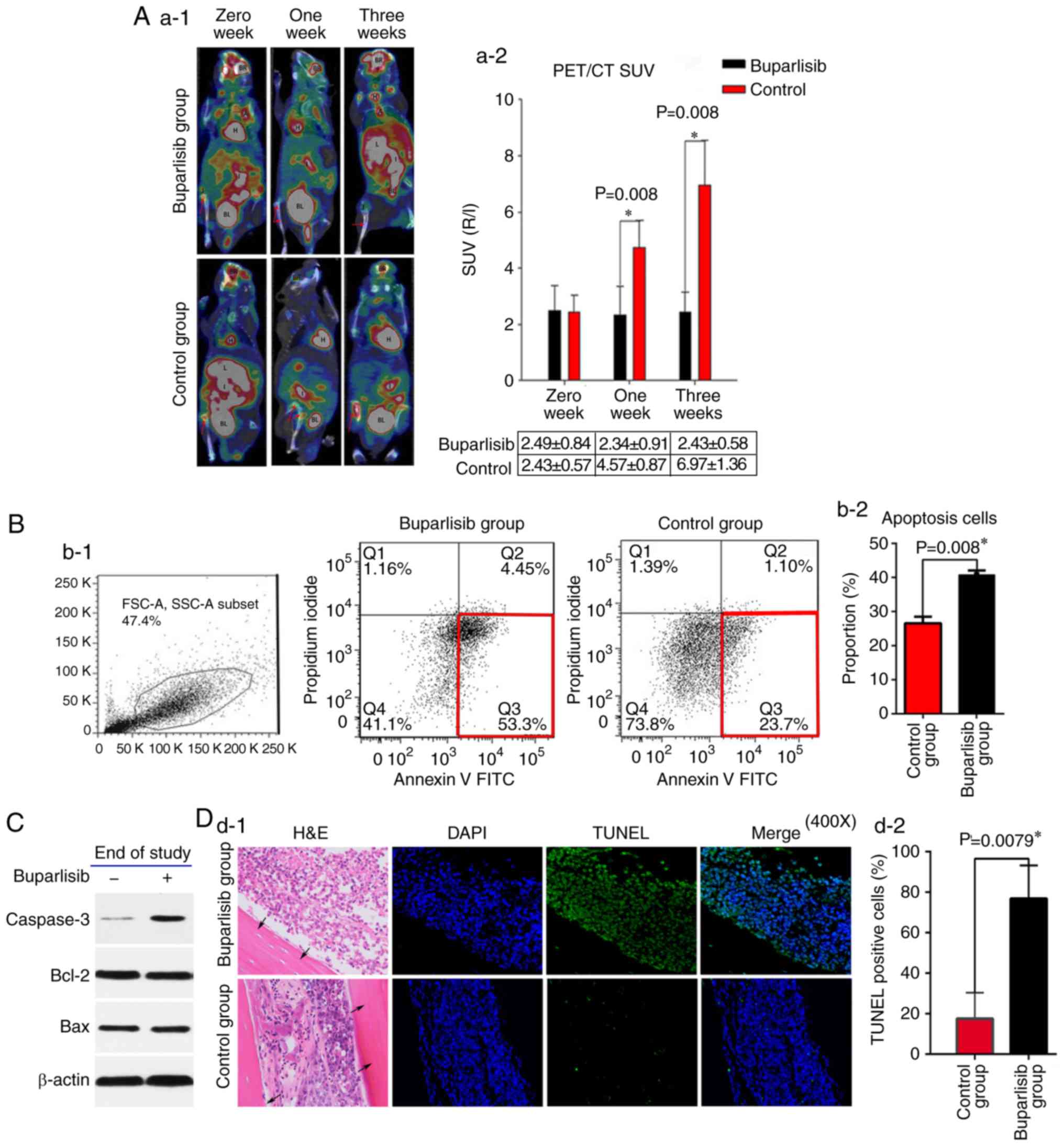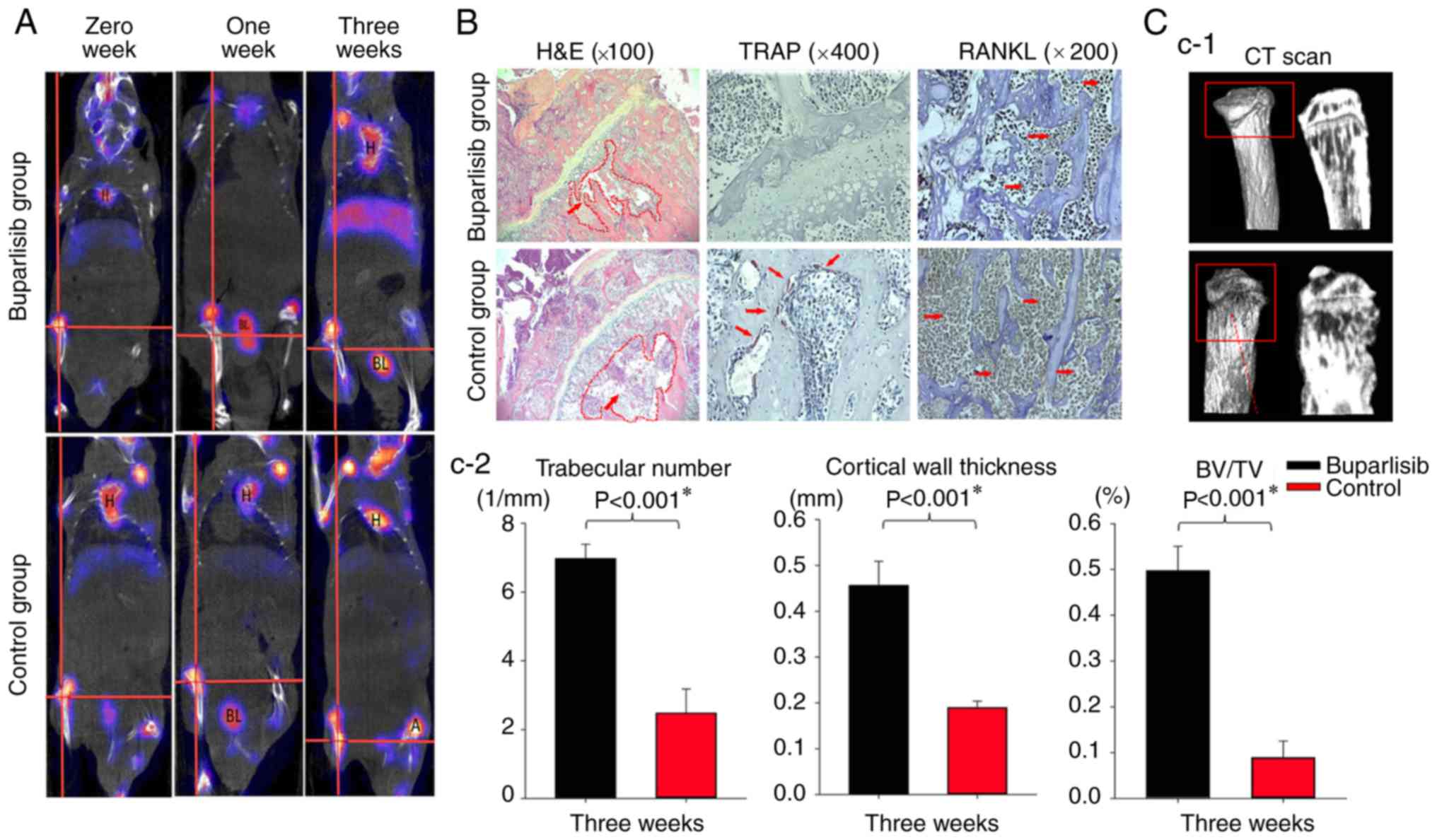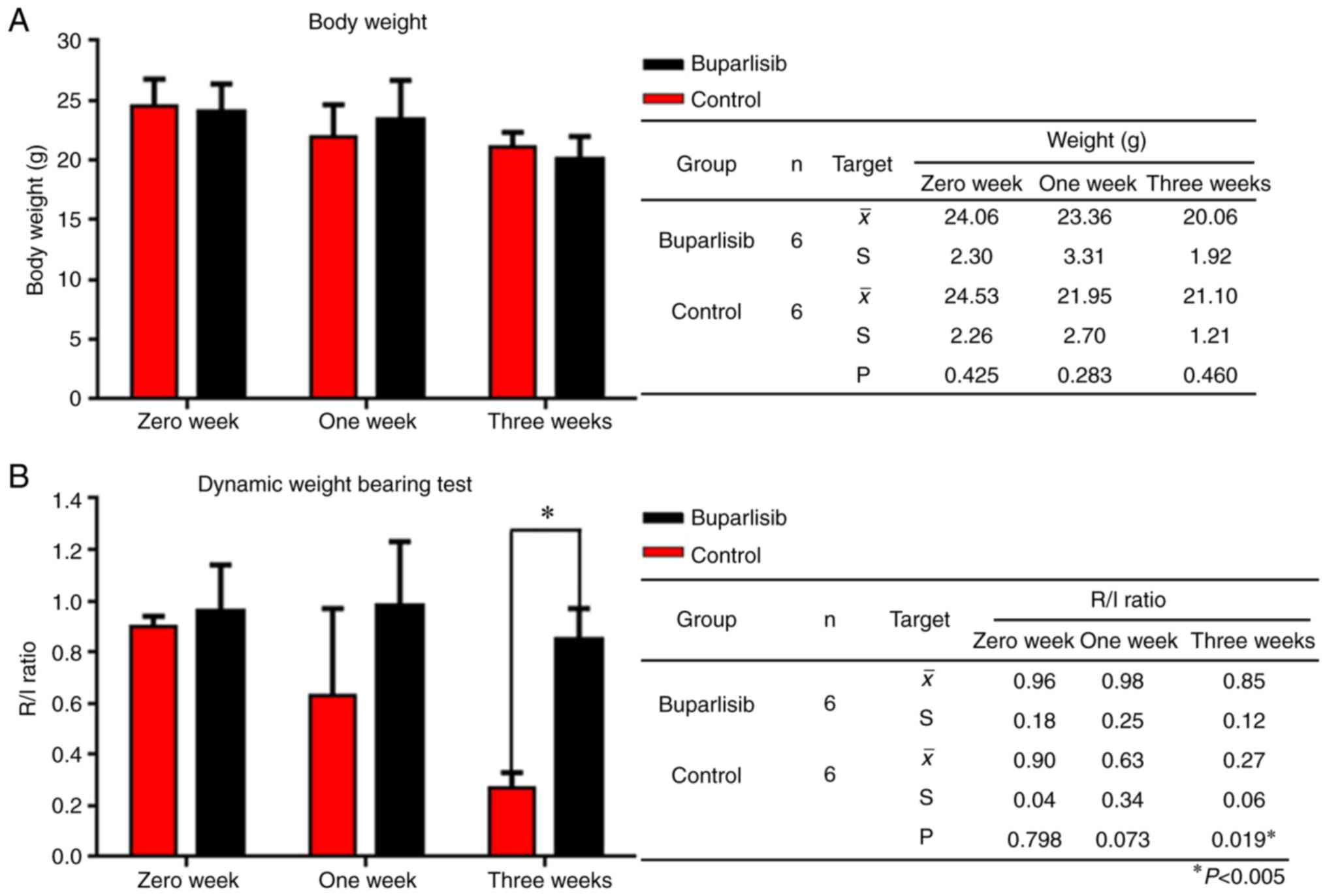|
1
|
Siegel RL, Miller KD and Jemal A: Cancer
statistics, 2017. CA Cancer J Clin. 67:7–30. 2017. View Article : Google Scholar : PubMed/NCBI
|
|
2
|
Chen W, Zheng R, Baade PD, Zhang S, Zeng
H, Bray F, Jemal A, Yu XQ and He J: Cancer statistics in China,
2015. CA Cancer J Clin. 66:115–132. 2016. View Article : Google Scholar : PubMed/NCBI
|
|
3
|
Ferlay J, Soerjomataram I, Dikshit R, Eser
S, Mathers C, Rebelo M, Parkin DM, Forman D and Bray F: Cancer
incidence and mortality worldwide: Sources, methods and major
patterns in GLOBOCAN 2012. Int J Cancer. 136:E359–E386. 2015.
View Article : Google Scholar : PubMed/NCBI
|
|
4
|
Riihimäki M, Hemminki A, Fallah M, Thomsen
H, Sundquist K, Sundquist J and Hemminki K: Metastatic sites and
survival in lung cancer. Lung Cancer. 86:78–84. 2014. View Article : Google Scholar : PubMed/NCBI
|
|
5
|
Coleman RE: Clinical features of
metastatic bone disease and risk of skeletal morbidity. Clin Cancer
Res. 12 (Suppl):S6243–S6249. 2006. View Article : Google Scholar
|
|
6
|
Cheung FH: The practicing orthopedic
surgeon's guide to managing long bone metastases. Orthop Clin North
Am. 45:109–119. 2014. View Article : Google Scholar : PubMed/NCBI
|
|
7
|
Ratasvuori M, Wedin R, Hansen BH, Keller
J, Trovik C, Zaikova O, Bergh P, Kalen A and Laitinen M: Prognostic
role of en-bloc resection and late onset of bone metastasis in
patients with bone-seeking carcinomas of the kidney, breast, lung,
and prostate: SSG study on 672 operated skeletal metastases. J Surg
Oncol. 110:360–365. 2014. View Article : Google Scholar : PubMed/NCBI
|
|
8
|
Weber KL, Randall RL, Grossman S and
Parvizi J: Management of lower-extremity bone metastasis. J Bone
Joint Surg Am. 88 (Suppl 4):S11–S19. 2006. View Article : Google Scholar
|
|
9
|
Zhu M, Liang R, Pan LH, Huang B, Qian W,
Zhong JH, Zheng WW and Li CL: Zoledronate for metastatic bone
disease and pain: A meta-analysis of randomized clinical trials.
Pain Med. 14:257–264. 2013. View Article : Google Scholar : PubMed/NCBI
|
|
10
|
Lopez-Olivo MA, Shah NA, Pratt G, Risser
JM, Symanski E and Suarez-Almazor ME: Bisphosphonates in the
treatment of patients with lung cancer and metastatic bone disease:
A systematic review and meta-analysis. Support Care Cancer.
20:2985–2998. 2013. View Article : Google Scholar
|
|
11
|
Wong MH, Stockler MR and Pavlakis N:
Bisphosphonates and other bone agents for breast cancer. Cochrane
Database Syst Rev. CD0034742012.PubMed/NCBI
|
|
12
|
Mhaskar R, Redzepovic J, Wheatley K, Clark
OA, Miladinovic B, Glasmacher A, Kumar A and Djulbegovic B:
Bisphosphonates in multiple myeloma: A network meta-analysis.
Cochrane Database Syst Rev. CD0031882012.PubMed/NCBI
|
|
13
|
Peng X, Guo W, Ren T, Lou Z, Lu X, Zhang
S, Lu Q and Sun Y: Differential expression of the RANKL/RANK/OPG
system is associated with bone metastasis in human non-small cell
lung cancer. PLoS One. 8:e583612013. View Article : Google Scholar : PubMed/NCBI
|
|
14
|
Mundy GR: Metastasis to bone: Causes,
consequences and therapeutic opportunities. Nat Rev Cancer.
2:584–593. 2002. View
Article : Google Scholar : PubMed/NCBI
|
|
15
|
Cappuzzo F, Ligorio C, Jänne PA, Toschi L,
Rossi E, Trisolini R, Paioli D, Holmes AJ, Magrini E, Finocchiaro
G, et al: Prospective study of gefitinib in epidermal growth factor
receptor fluorescence in situ
hybridization-positive/phospho-Akt-positive or never smoker
patients with advanced non-small-cell lung cancer: The ONCOBELL
trial. J Clin Oncol. 25:2248–2255. 2007. View Article : Google Scholar : PubMed/NCBI
|
|
16
|
Tsurutani J, Fukuoka J, Tsurutani H, Shih
JH, Hewitt SM, Travis WD, Jen J and Dennis PA: Evaluation of two
phosphorylation sites improves the prognostic significance of Akt
activation in non-small-cell lung cancer tumors. J Clin Oncol.
24:306–314. 2006. View Article : Google Scholar : PubMed/NCBI
|
|
17
|
Chan BA and Hughes BG: Targeted therapy
for non-small cell lung cancer: Current standards and the promise
of the future. Transl Lung Cancer Res. 4:36–54. 2015.PubMed/NCBI
|
|
18
|
La Monica S, Galetti M, Alfieri RR,
Cavazzoni A, Ardizzoni A, Tiseo M, Capelletti M, Goldoni M,
Tagliaferri S, Mutti A, et al: Everolimus restores gefitinib
sensitivity in resistant non-small cell lung cancer cell lines.
Biochem Pharmacol. 78:460–468. 2009. View Article : Google Scholar : PubMed/NCBI
|
|
19
|
Sos ML, Fischer S, Ullrich R, Peifer M,
Heuckmann JM, Koker M, Heynck S, Stückrath I, Weiss J, Fischer F,
et al: Identifying genotype-dependent efficacy of single and
combined PI3K- and MAPK-pathway inhibition in cancer. Proc Natl
Acad Sci USA. 106:18351–18356. 2009. View Article : Google Scholar : PubMed/NCBI
|
|
20
|
Zito CR, Jilaveanu LB, Anagnostou V, Rimm
D, Bepler G, Maira SM, Hackl W, Camp R, Kluger HM and Chao HH:
Multi-level targeting of the phosphatidylinositol-3-kinase pathway
in non-small cell lung cancer cells. PLoS One. 7:e313312012.
View Article : Google Scholar : PubMed/NCBI
|
|
21
|
Engelman JA, Chen L, Tan X, Crosby K,
Guimaraes AR, Upadhyay R, Maira M, McNamara K, Perera SA, Song Y,
et al: Effective use of PI3K and MEK inhibitors to treat mutant
Kras G12D and PIK3CA H1047R murine lung cancers. Nat Med.
14:1351–1356. 2008. View Article : Google Scholar : PubMed/NCBI
|
|
22
|
Maira SM, Pecchi S, Huang A, Burger M,
Knapp M, Sterker D, Schnell C, Guthy D, Nagel T, Wiesmann M, et al:
Identification and characterization of NVP-BKM120, an orally
available pan-class I PI3-kinase inhibitor. Mol Cancer The.
11:317–328. 2013. View Article : Google Scholar
|
|
23
|
Speranza MC, Nowicki MO, Behera P, Cho CF,
Chiocca EA and Lawler SE: BKM-120 (Buparlisib): A
Phosphatidyl-Inositol-3 kinase inhibitor with anti-invasive
properties in glioblastoma. Sci Rep. 6:201892016. View Article : Google Scholar : PubMed/NCBI
|
|
24
|
Ren H, Chen M, Yue P, Tao H, Owonikoko TK,
Ramalingam SS, Khuri FR and Sun SY: The combination of RAD001 and
NVP-BKM120 synergistically inhibits the growth of lung cancer in
vitro and in vivo. Cancer Lett. 325:139–146. 2012. View Article : Google Scholar : PubMed/NCBI
|
|
25
|
Wu TT, Sikes RA, Cui Q, Thalmann GN, Kao
C, Murphy CF, Yang H, Zhau HE, Balian G and Chung LW: Establishing
human prostate cancer cell xenografts in bone: Induction of
osteoblastic reaction by prostate-specific antigen-producing tumors
in athymic and SCID/bg mice using LNCaP and lineage-derived
metastatic sublines. Int J Cancer. 77:887–894. 1998. View Article : Google Scholar : PubMed/NCBI
|
|
26
|
Quadros AU, Pinto LG, Fonseca MM, Kusuda
R, Cunha FQ and Cunha TM: Dynamic weight bearing is an efficient
and predictable method for evaluation of arthritic nociception and
its pathophysiological mechanisms in mice. Sci Rep. 5:146482015.
View Article : Google Scholar : PubMed/NCBI
|
|
27
|
Heudel PE, Fabbro M, Roemer-Becuwe C,
Kaminsky MC, Arnaud A, Joly F, Roche-Forestier S, Meunier J, Foa C,
You B, et al: Phase II study of the PI3K inhibitor BKM120 in
patients with advanced or recurrent endometrial carcinoma: A
stratified type I–II study from the GINECO group. Br J Cancer:.
116:303–309. 2017. View Article : Google Scholar : PubMed/NCBI
|
|
28
|
Martín M, Chan A, Dirix L, O'Shaughnessy
J, Hegg R, Manikhas A, Shtivelband M, Krivorotko P, Batista López
N, Campone M, et al: A randomized adaptive phase II/III study of
buparlisib, a pan-class I PI3K inhibitor, combined with paclitaxel
for the treatment of HER2- advanced breast cancer (BELLE-4). Ann
Oncol. 28:313–320. 2017.PubMed/NCBI
|
|
29
|
Vansteenkiste JF, Canon JL, De Braud F,
Grossi F, De Pas T, Gray JE, Su WC, Felip E, Yoshioka H, Gridelli
C, et al: Safety and efficacy of Buparlisib (BKM120) in patients
with PI3K pathway-activated non-small cell lung cancer: Results
from the phase II BASALT-1 study. J Thorac Oncol. 10:1319–1327.
2015. View Article : Google Scholar : PubMed/NCBI
|
|
30
|
Blazquez R, Wlochowitz D, Wolff A, Seitz
S, Wachter A, Perera-Bel J, Bleckmann A, Beißbarth T, Salinas G,
Riemenschneider MJ, et al: PI3K: A master regulator of brain
metastasis-promoting macrophages/microglia. Glia. 66:2438–2455.
2018. View Article : Google Scholar : PubMed/NCBI
|
|
31
|
Campone M, Im SA, Iwata H, Clemons M, Ito
Y, Awada A, Chia S, Jagiełło-Gruszfeld A, Pistilli B, Tseng LM, et
al: Buparlisib plus fulvestrant versus placebo plus fulvestrant for
postmenopausal, hormone receptor-positive, human epidermal growth
factor receptor 2-negative, advanced breast cancer: Overall
survival results from BELLE-2. Eur J Cancer. 103:147–154. 2018.
View Article : Google Scholar : PubMed/NCBI
|
|
32
|
Gdowski AS, Ranjan A and Vishwanatha JK:
Current concepts in bone metastasis, contemporary therapeutic
strategies and ongoing clinical trials. J Exp Clin Cancer Res.
36:1082017. View Article : Google Scholar : PubMed/NCBI
|
|
33
|
National Comprehensive Cancer Network
Clinical Practice in Oncology (NCCN Guideline), . 2017, https://www.nccn.org/professionals/physician_gls/pdf/nscl.pdf
|
|
34
|
Saad F, Gleason DM, Murray R, Tchekmedyian
S, Venner P, Lacombe L, Chin JL, Vinholes JJ, Goas JA and Zheng M;
Zoledronic Acid Prostate Cancer Study Group, : Long-term efficacy
of zoledronic acid for the prevention of skeletal complications in
patients with metastatic hormone-refractory prostate cancer. J Natl
Cancer Inst. 96:879–882. 2014. View Article : Google Scholar
|
|
35
|
Fizazi K, Carducci M, Smith M, Damião R,
Brown J, Karsh L, Milecki P, Shore N, Rader M, Wang H, Jiang Q, et
al: Denosumab versus zoledronic acid for treatment of bone
metastases in men with castration-resistant prostate cancer: A
randomised, double-blind study. Lancet. 377:813–822. 2011.
View Article : Google Scholar : PubMed/NCBI
|
|
36
|
Lipton A, Fizazi K, Stopeck AT, Henry DH,
Brown JE, Yardley DA, Richardson GE, Siena S, Maroto P, Clemens M,
et al: Superiority of denosumab to zoledronic acid for prevention
of skeletal-related events: A combined analysis of 3 pivotal,
randomised, phase 3 trials. Eur J Cancer. 48:3082–3092. 2012.
View Article : Google Scholar : PubMed/NCBI
|
|
37
|
Gan ZY, Fitter S, Vandyke K, To LB,
Zannettino AC and Martin SK: The effect of the dual PI3K and mTOR
inhibitor BEZ235 on tumour growth and osteolytic bone disease in
multiple myeloma. Eur J Haematol. 94:343–354. 2015. View Article : Google Scholar : PubMed/NCBI
|
|
38
|
Roodman GD: Mechanisms of bone metastasis.
N Engl J Med. 350:1655–1664. 2004. View Article : Google Scholar : PubMed/NCBI
|
|
39
|
Xuan W, Feng X, Qian C, Peng L, Shi Y, Xu
L, Wang F and Tan W: Osteoclast differentiation gene expression
profiling reveals chemokine CCL4 mediates RANKL-induced osteoclast
migration and invasion via PI3K pathway. Cell Biochem Funct.
35:171–177. 2017. View Article : Google Scholar : PubMed/NCBI
|
|
40
|
Blüml S, Friedrich M, Lohmeyer T, Sahin E,
Saferding V, Brunner J, Puchner A, Mandl P, Niederreiter B, Smolen
JS, et al: Loss of phosphatase and tensin homolog (PTEN) in myeloid
cells controls inflammatory bone destruction by regulating the
osteoclastogenic potential of myeloid cells. Ann Rheum Dis.
74:227–233. 2015. View Article : Google Scholar : PubMed/NCBI
|
|
41
|
Zhu W, Hu X, Xu J, Cheng Y, Shao Y and
Peng Y: Effect of PI3K/Akt signaling pathway on the process of
prostate cancer metastasis to bone. Cell Biochem Biophys.
72:171–177. 2015. View Article : Google Scholar : PubMed/NCBI
|
|
42
|
Ek-Rylander B, Flores M, Wendel M,
Heinegård D and Andersson G: Dephosphorylation of osteopontin and
bone sialoprotein by osteoclastic tartrate-resistant acid
phosphatase. Modulation of osteoclast adhesion in vitro. J Biol
Chem. 269:14853–14856. 1994.PubMed/NCBI
|
|
43
|
Momcilovic M and David B: Imaging cancer
metabolism. Biomol Ther (Seoul). 26:81–92. 2018. View Article : Google Scholar : PubMed/NCBI
|
|
44
|
Schober O and Riemann B: Recent results in
cancer research: Molecular imaging in oncology. Springer-Verlag
Berlin Heidelberg. 187:2012.
|
|
45
|
Yao Z, Zhang BS and Prescher JA: Advances
in bioluminescence imaging: New probes from old recipes. Curr Opin
Chem Biol. 45:148–156. 2018. View Article : Google Scholar : PubMed/NCBI
|
|
46
|
Cook G Jr, Parker C, Chua S, Johnson B,
Aksnes AK and Lewington VJ: 18F-fluoride PET: Changes in uptake as
a method to assess response in bone metastases from
castrate-resistant prostate cancer patients treated with
223Ra-chloride (Alpharadin). EJNMMI Res. 1:42011. View Article : Google Scholar : PubMed/NCBI
|
|
47
|
Bao X, Wang MW, Luo JM, Wang SY, Zhang YP
and Zhang YJ: Optimization of early response monitoring and
prediction of cancer antiangiogenesis therapy via noninvasive PET
molecular imaging strategies of multifactorial bioparameters.
Theranostics. 6:2084–2098. 2016. View Article : Google Scholar : PubMed/NCBI
|
|
48
|
Zhang F, Zhu L, Liu G, Hida N, Lu G, Eden
HS, Niu G and Chen X: Multimodality imaging of tumor response to
doxil. Theranostics. 1:302–309. 2011. View Article : Google Scholar : PubMed/NCBI
|
|
49
|
Werbeck JL, Thudi NK, Martin CK,
Premanandan C, Yu L, Ostrowksi MC and Rosol TJ: Tumor
microenvironment regulates metastasis and metastasis genes of mouse
MMTV-PymT mammary cancer cells in vivo. Vet Pathol. 51:868–881.
2014. View Article : Google Scholar : PubMed/NCBI
|


















